Congratulations, Dr. San José Orduna!
Jesús San José Orduna, PhD student under the supervision of Dr. Mónica H. Pérez Temprano (ICIQ), has defended his PhD thesis entitled “Trapping Elusive Cp*CoIII Metallacycles: Implications in C–H Functionalization Processes” (assigned to the Department of Analytical and Organic Chemistry of the Universitat Rovira i Virgili) publicly on February 21st at the ICIQ Auditorium.
The members of the examining committee were: Prof. Bill Morandi (ETH Zurich), Dr. Jesús Campos (University of Sevilla) and Prof. Anat Milo (Ben-Gurion University of Negev).
Dr. San José Orduna was born and raised in Santa Coloma de Gramenet, near Barcelona. He obtained his Chemistry degree and Master in Organic Chemistry from the University of Barcelona (UB) and then joined the Pérez-Temprano group to pursue his PhD. During this time, he did a research stay at Prof. Macgregor’s group (Edinburgh) thanks to a COST-ACTION (CA15106 CHAOS) fellowship. He loves traveling and discovering new places, playing all kinds of outdoor sports and is always ready to enjoy a good craft beer accompanied by any strong cheese.
Why did you become a scientist?
I have always been that annoying kid that, driven by pure curiosity, is always asking “Why this?” or “Why that?”. First, I was interested in comprehending the intricacies of the human mind, so I wanted to study psychology. However, when I was taught about the powerful impact that a simple molecule can have in our complex brain, chemistry immediately caught my attention. After some diversions, I ended up doing my thesis about organometallic chemistry but I don’t rule out the possibility of studying something more related to biochemistry in the future. My ultimate goal as a scientist is to become a good mentor, capable of conveying my curiosity and passion for science to younger students, and help them overcome unthinkable challenges. In other words, I aspire to achieve the same as Mónica, my supervisor, accomplished with me.
From the lessons learnt at ICIQ, which one do you value the most?
I keep the values and training that Monica has taught me. How she cares for all the members of the group and let’s us develop personally and scientifically. The most valuable lesson I’ve learnt in the lab is that spending a week sitting, reading, thinking and designing your next reactions can save you months of failed experiments.
What ICIQ moment you´ll never forget? What will you miss the most from ICIQ?
I’ll always remember the adrenaline rush when I received an email from the X-ray unit, confirming that I had tracked down my first reaction intermediate, proposed many times but never experimentally detected. I will not forget either the exact moment that, Juan (a former postdoc) and I, discovered that we could optimize the reaction we were studying, from 20 hours to less than 2 minutes. After several months struggling to make that reaction happen, seeing it working instantaneously in front of our eyes was mind-blowing! You should’ve seen our faces…
Without any doubts, I will miss the most all the amazing people I met during these four years. I’m determined to do whatever I can to stay in touch with the majority of them.
What do you wish you had known at the beginning of your PhD?
I wish I would have known not to take bad results personally. At first, it’s almost inevitable to think that things go wrong because you either aren’t doing things properly or you that aren’t good enough. Eventually one realizes that how we accept and learn from our mistakes is what defines us as scientists.
Where are you going next? What will you do there?
These last four years have been quite intense, especially during the final stretch, so I’m going to take some time to disconnect. I will start over again my climbing and hiking hobbies, and most probably walk a part of “El camino de Santiago”. With the batteries charged again, I’ll look for a postdoc position in Europe – but there are so many fields that attract my attention that I have not decided yet!
If you were a piece of lab equipment, what would you be?
It would certainly be an NMR tube, I spent these four years surrounded by them! Specifically, I would be a J-young NMR tube because they are fragile but at the same time capable of withstanding great pressures.
Related news

Let's create a brighter future
Join our team to work with renowned researchers, tackle groundbreaking
projects and contribute to meaningful scientific advancements








 20-12-2024
20-12-2024 


















